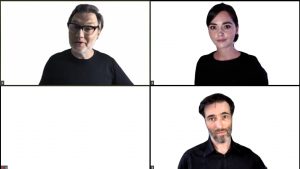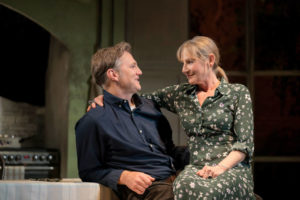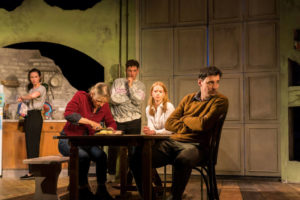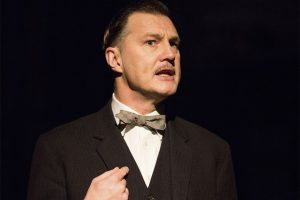Live reading of Stoppard zooms off the page
★★★★

The Remote Read is an exciting project born out of the coronavirus lockdown. The producers Curtain Call are intending to bring together actors in their own homes via Zoom for live performances of plays. The first was A Separate Peace which streamed on Sunday 2 May 2020.
Proceeds (you have to buy a ticket) go to The Felix Project, a charity which helps vulnerable people in need of food. Whether for this reason or simply that they’re glad of something to do, a top notch cast assembled for this half hour production, led by the wonderful David Morrissey, all soft-spoken and twinkly-eyed.
I didn’t know the play. It was written for television back in 1966, about the time of Tom Stoppard’s first theatrical hit Rosencrantz And Guildenstern Are Dead. It owes something I think to Pinter and Beckett in that John Brown played by David Morrissey arrives at an anonymous nursing home. There’s nothing wrong with him but he has a suitcase of cash and just wants to stay there, being looked after and doing nothing. The nursing staff take him in but, even though he is no way sinister or even difficult, they cannot resist finding out who he is and trying to ‘help’ him.
So it’s about the right to privacy, our inability to leave someone alone without wanting to know more or do we think is best for them, and society’s discomfort with people who do nothing.
This is an absorbing play with some excellent dialogue. ‘It’s not good for you, what you’re doing,’ says one of the staff. ‘You mean it’s not good for you,’ says Brown.
The members of staff were played by Denise Gough as a Doctor, Ed Stoppard as the Matron, Maggie Service as a Nurse and Jenna Coleman as Nurse Maggie Coates (the only other character given a full name). She was the one who befriended John Brown. The subtle way she conveyed her liking of him and her wrestling with her conscience as she ultimately betrayed him was outstanding.
So how did it work on Zoom? Quite well, thanks to director Sam Yates. The actors might have been positioned sideways so they appeared to be talking to each other. Instead, they all faced the camera and this was curiously effective. With both actors looking at you while they talked to each other, it was as if you were invisible but standing in the middle of the conversations.
The actors in simple black tops were placed against white backgrounds which cut out any distractions from bookcases or trophies or whatever actors often have in their homes. Unfortunately Zoom works with some kind of facial recognition when you use a background so there can be distortion and blurring.
That’s a minor point. It was a nice touch that as John Brown painted a mural in his room that countryside scene gradually replaced his white background, indicating perhaps that he was receiving the calm of isolation that he craved. The editing was very smooth as actors appeared and disappeared very much like entrances and exits on a stage.
Actually it was more akin to a television programme than a stage show, but it was very exciting that it was live and, as I understand it, unrecorded. This meant there was a real sense of being at a unique event.
A Separate Peace was billed as a reading but, apart from someone looking down occasionally, it came across as a well prepared and well-acted performance. I look forward to more from The Reading Room.


